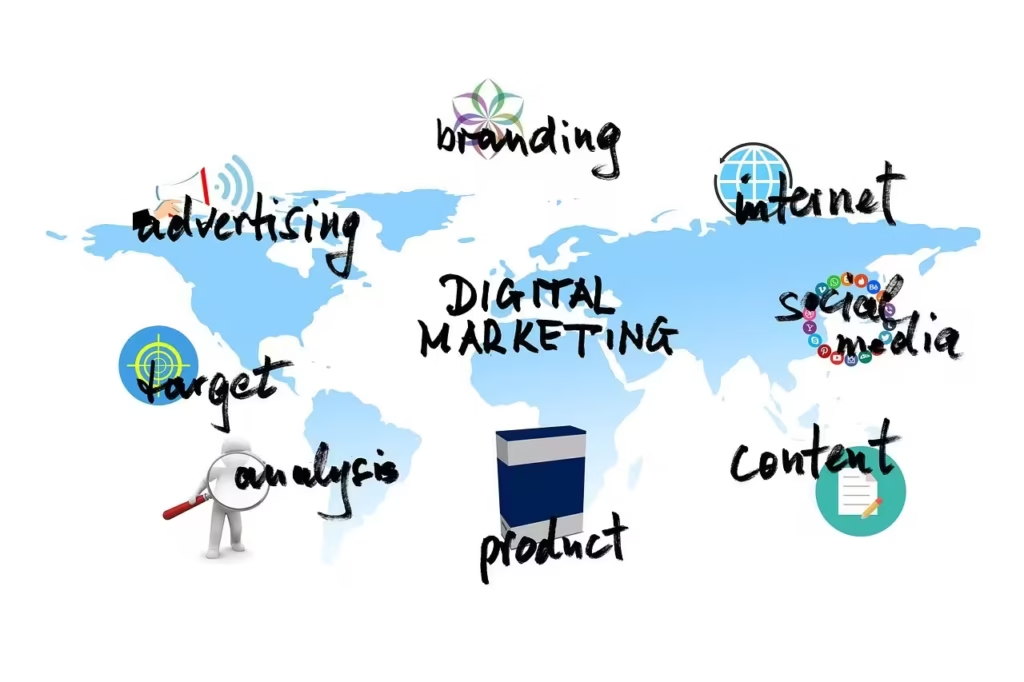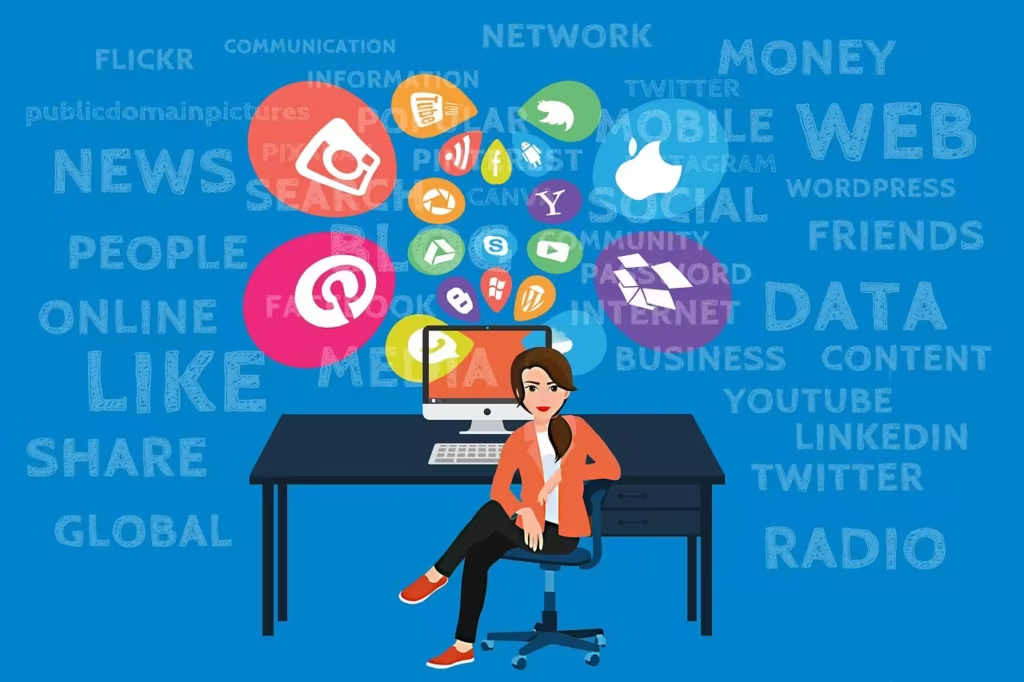In today’s fast-paced online world, choosing the right marketing strategy can feel like standing at a crossroads. On one side, you have digital marketing, the broad umbrella that covers everything from SEO to social media.
On the other, there’s performance marketing, laser-focused on measurable outcomes and specific actions. At Digi Simba, we blend both to help brands grow smartly and sustainably. Here, we will talk about Performance Marketing vs Digital Marketing.
But before we talk integration, let’s break down what makes each approach tick and how you can harness their strengths.
What is Digital Marketing?
Now, imagine you are opening a new coffee shop in town. The good intention is to inform the world about the cozy atmosphere, special lattes, and live music that happens on the weekend.
Digital marketing is all the online hustle, thereby helping in promotion – think blog posts about the origin of your coffee, email market newsletters with exclusive offers, engaging Instagram stories, and SEO strategies to push you to the top of local searches.
Here are some avenues of digital marketing:
- Content Marketing: Articles, blog posts, videos, and infographics that establish authority – a.k.a.” thought leadership”.
- SEO (Search Engine Optimization): Tinkering with your website so that Google goes, ” Hey, this looks useful!”
- Social Media Marketing: Engaging posts appearing on sites like Facebook, Instagram, LinkedIn, and TikTok – if that is where your audience meets.
- Email Marketing: A type of marketing involving newsletters, promotions, and drip campaigns to nurture relationships.
- Display Advertising: Banner ads that show up on sites your customers may visit.
Why it works? Digital marketing is fantastic for building brand awareness and nurturing long-term relationships. You’re playing the long game, establishing trust, and creating a consistent brand voice that keeps people coming back.
What is Performance Marketing?

Imagine you just perfected that latte art, and you want these tables full fast. Here’s where performance marketing comes into play. The strategy is all about measurability regarding results: Specific actions.
Instead of paying for viewership or impressions, an advertiser pays only when an actual event occurs – a click, a completed form, a sale, an app download, and so on.
The key channels of performance marketing are:
- Pay Per Click: Pay on clicks on ads on Google or Bing.
- Affiliate Marketing: Pay your partners on commission; they drive real sales.
- Social Ads: Conversion-optimized ads on Facebook, Instagram, LinkedIn, and TikTok.
- Native Advertising: Sponsored content that sits naturally within the publisher’s site.
- Influencer Campaigns: Collaborated campaigns with set KPIs (e.g., sign-ups).
Why it works? Performance marketing is goal-orientated and short-term in nature. It would be highly useful when you want instant traction about a flash sale, an exciting new product, or intense app downloads.
You get real-time conversion rate metrics, so you can play with your budgets for better ROI.
Breaking Down the Differences:
Let’s compare performance marketing vs digital marketing side by side to get a clearer picture:
| Aspect | Digital Marketing | Performance Marketing |
| Primary Goal | Brand building and engagement | Immediate conversions and ROI |
| Payment Model | Pay for reach and placements | Advertisers only pay for completed actions |
| Timeframe | Medium to long-term impact | Short-term, results-oriented |
| Key Metrics | Impressions, engagement, followers, organic traffic | Clicks, leads, sales, downloads |
| Focus | Content-rich strategies, relationship building | Data-driven ads, high-performing creatives |
| Risk & Reward | Lower risk, slower payoff | Higher risk, potentially faster and clearer rewards |
When to Lean on Performance Marketing?
Performance marketing focuses on the following scenarios:
- Flash Sales & Promotions: Want to clear inventory fast? A PPC or social ad campaign can be set up for purchase-orientated results, so you pay only when a purchase happens.
- App Launches: Need fast downloads? A focused performance campaign can bring installs and keep the CPA low.
- Lead Generation: If the sales team requires qualified leads, performance marketing funnels interested parties in sign-up forms or demo requests.
- Seasonal Campaigns: During festive or holiday seasons, ramping up performance marketing keeps demand spikes in check.
It being so measurable lets you switch your creatives, landing pages, and bids on the fly, making every rupee count.
When to Invest in Digital Marketing?
Digital marketing is your go-to choice for:
- Brand Storytelling: Share your café’s origin story through blog posts or videos.
- Community Building: Engage with your regulars on social media, hold virtual events, or circulate a heartening newsletter via email.
- SEO Growth: Improve your search rankings by generating helpful content tied to the keywords your audience goes for.
- Long-Term Trust: Let white papers, webinars, and constant social interaction help you build trust through leadership.
The theatres are patient but build a stronger emotional bond with the audience, which is necessary for enduring loyalty.
Why You Don’t Have to Choose?
The thing is, they are not foes but rather teammates. At Digi Simba, we create hybrid campaigns that marry the tortoise-like benefits of digital marketing with the hare-like gains of performance marketing.
Sample Hybrid Approach:
- Awareness Phase: Start launching blog posts and social media posts about your new product line (digital marketing).
- Engagement Phase: Run email marketing campaigns to nurture interested subscribers.
- Conversion Phase: Set up performance marketing ads targeting those who visited your site but did not convert.
- Retention Phase: Retargeting ads and loyalty emails will do the trick here.
The multi-pronged approach ensures that you are building your brand and, at the same time, driving measurable results.
How Salaries Stack Up?
So, you are curious about performance marketing vs digital marketing salaries. Here is a rough View of the median for mid-level professionals in India: Digital Marketing Positions (SEO managers, content strategists, social media experts): ₹3.5 L to ₹7 L per annum.
Performance Marketing Positions (PPC specialists, growth marketers): ₹5 L to ₹10 L+ per annum. Just another point: since performance marketing directly impacts the bottom line, generally, it gets paid higher.
But your skills and experience matter much more than your titles. Become an expert in email marketing or content marketing, and you are ready to grow in either arena.
Pros and Cons: A Quick Rundown

| Marketing Type | Advantages | Limitations |
| Digital Marketing | 1. Builds strong brand awareness and long-term trust. 2. Engages audiences across multiple platforms. 3. Supports sustainable growth through SEO and content marketing. | 1. Result-based advertisers only pay for specific actions. 2. Fast and measurable outcomes with defined KPIs. 3. Highly scalable and flexible for campaign adjustments. |
| Performance Marketing | 1. Slower to deliver measurable ROI. 2. Attribution can be complex across multiple channels. 3. Costs can escalate without proper monitoring. | 1. Focuses less on brand-building. 2. Dependent on constant optimization. 3. Costs can escalate without proper monitoring. |
Key Takeaways:
- Digital marketing builds the foundation for stories, communities, and organic reach.
- Performance marketing drives the engine of quick conversions, clear ROI, and actionable data.
- Blending both creates a balanced strategy that fuels growth at every stage.
- Align your choice with your immediate goals: brand equity vs. short-term sales.
Conclusion on Performance Marketing vs Digital Marketing
At the end of it all, the “best” strategy shall never exclude any option from the others. Your brand ought to have a composite base: the power of storytelling fused with digital marketing and the accountability attached to performance marketing.
Whether you’re prepping for a product launch or nurturing your community for a long period, Digi Simba is here to forge campaigns that feel humanistic, produce results, and keep you ahead of the curve.
That’s all about the performance marketing vs digital marketing. Ready to mix the art of storytelling with conversion science? If so, chat with us, and let’s develop a strategy uniquely tailored to your brand!
Frequently Asked Questions Regarding Performance Marketing vs Digital Marketing
Below are the answers to the most asked queries on the internet regarding Performance Marketing vs Digital Marketing.
1. Do you typically find performance marketing salaries higher than digital marketing ones?
Since their actions directly translate into revenue generation, performance marketers earn anywhere between ₹5 L to ₹10 L+ p.a. Digital marketers are paid in the range of ₹3.5 L to ₹7 L on average, although with specialized skills in SEO/cost marketing, one can earn much more.
2. What are the advantages and disadvantages of performance marketing versus digital marketing?
Performance marketing provides immediate and measurable results where the payment is made only upon a successful action. Thus, while it may seem very transactional, it may get quite pricey if not optimized properly. Digital marketing builds strong brand trust and community, but you wait for a deeper ROI.
3. List out the points comparing marketing performance with digital marketing.
Digital marketing attempts to create brand awareness for an extended period through the creation of content, SEO, and social engagement. Performance marketing is focused on the bare conversion and will, more often than not, pay once an action is fulfilled.

